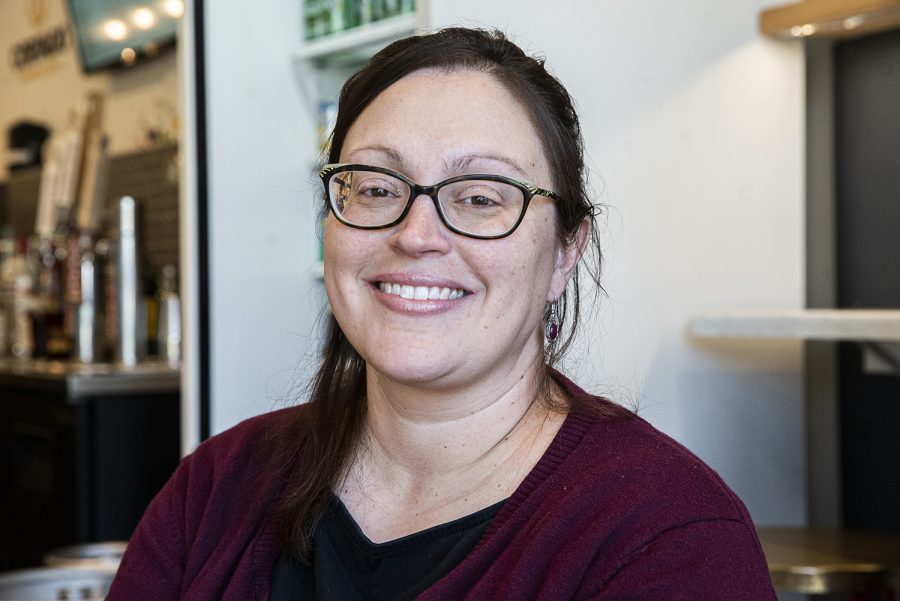UI aims to support students who stutter with diversity, equity, and inclusion initiative
Through a Diversity, Equity, and Inclusion initiative, the University of Iowa will host an event to raise awareness and build community for people who stutter.
Iowa City citizen Maggie Votroubek poses for a portrait in Cortado in downtown Iowa City on Tuesday, November 5th, 2019. Votroubek has stuttered since she was eight years old. (Tate Hildyard/The Daily Iowan)
November 5, 2019
Iowa City resident and leader of the Iowa chapter of the National Stuttering Association Maggie Votroubek began stuttering when she was 8 years old. Votroubek said she grew up feeling insecure about her stutter, and eventually sought help at the local Wendell Johnson Speech and Hearing Clinic.
Stuttering is a speech impediment characterized by the unwanted repetition of sounds or syllables, extended sounds, or what is known as “blocks” — a word or sound that is difficult for the person who stutters to say resulting in a pause, according to the American Speech-Language-Hearing Association.
“I’ve stuttered since I was a young kid, that’s always just been how I talked,” UI student Michael Steffen said.
The University of Iowa will host a screening of the award-winning documentary “My Beautiful Stutter” on Nov. 13, followed by a panel discussion featuring clinical and research stuttering experts. The UI Division of Diversity, Equity, and Inclusion and the Communications Sciences and Disorders Department will co-sponsor the event.
Votroubek said she often internalizes her thoughts and avoids conversation or eye contact with others, because she worries about how they will view her. She wonders if people think she’s not intelligent if she’s not necessarily speaking fluently, Votroubek said.
“It’s been a variable disorder for me,” Votroubek said. “At certain times, I’ll be more fluent and other times I’ll be more disfluent … It’s easy to hide my stuttering by not changing words when I block. But it’s OK to stutter, hiding doesn’t help anything.”
Steffen said there is no “one size fits all” trope to fit every person who stutters into, but many who stutter do feel the same burden of stereotyping.
“Until recently, I thought if I stuttered, I wouldn’t be taken seriously,” Steffen said. “I thought I couldn’t get certain jobs I wanted, I couldn’t meet the sort of people I wanted, and I couldn’t do the things I wanted to do.”
Steffen emphasized the need for representation of people who stutter in media and in the community, so that others who stutter can understand that their experiences and feelings about stuttering are echoed by their peers, and it’s OK to share that with others.
RELATED: UI unveils Diversity, Equity, and Inclusion action plan
Center for Diversity and Enrichment Assistant Director Nicholas Creary said the Diversity Equity and Inclusion Division is sponsoring the event for similar reasons.
“We are trying to increase our support for students with different abilities,” Creary said. “We want to make sure their interests and their needs are met. We wanted to provide support for this event because it supports our mission of uplifting students with physical or invisible challenges.”
Anu Subramanian, clinical associate professor at the Wendell Johnson Speech and Hearing Clinic associated with the UI, said that stuttering treatments are often multifaceted.
“For stuttering, the focus is not only on the stuttering behavior itself, but also the emotional effects of stuttering,” Subramanian said. “As we think about [Diversity, Equity, and Inclusion], the idea is that a lot of adults who stutter don’t necessarily think about how to eliminate the stutter but how to eliminate the stigma around stuttering so they can be more comfortable speaking.”
Steffen said working with Subramanian and the Wendell Johnson Clinic is empowering, because both connect people who stutter with one another and help them towards accepting their voice for what it is.
“We need environments like that,” Subramanian said. “…Where people who speak differently have the time to say what they want to say are accepted for that.”







